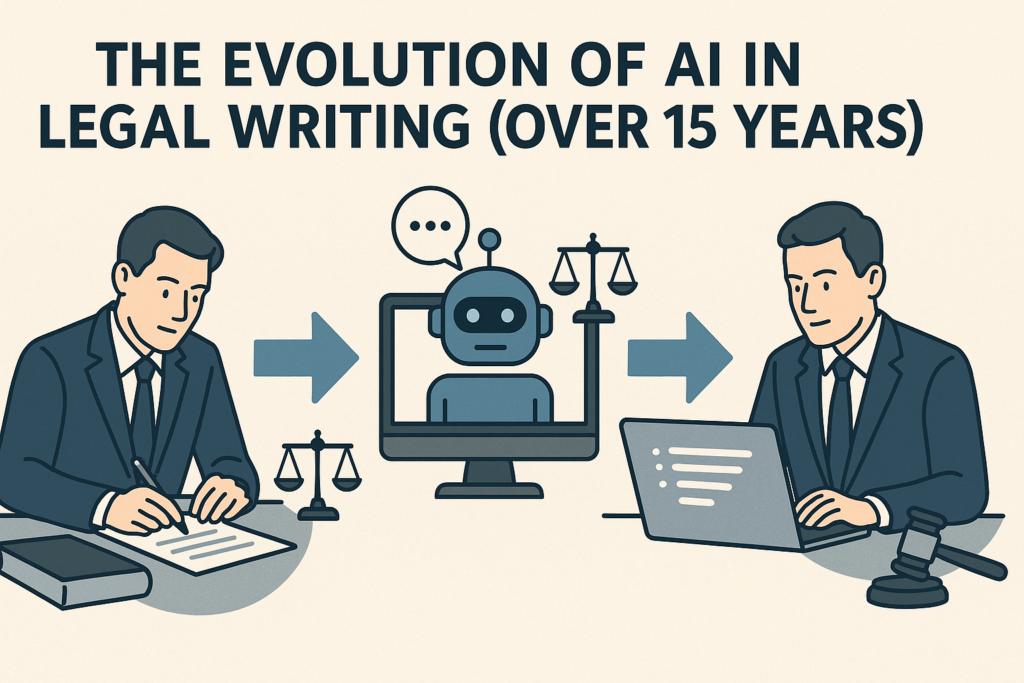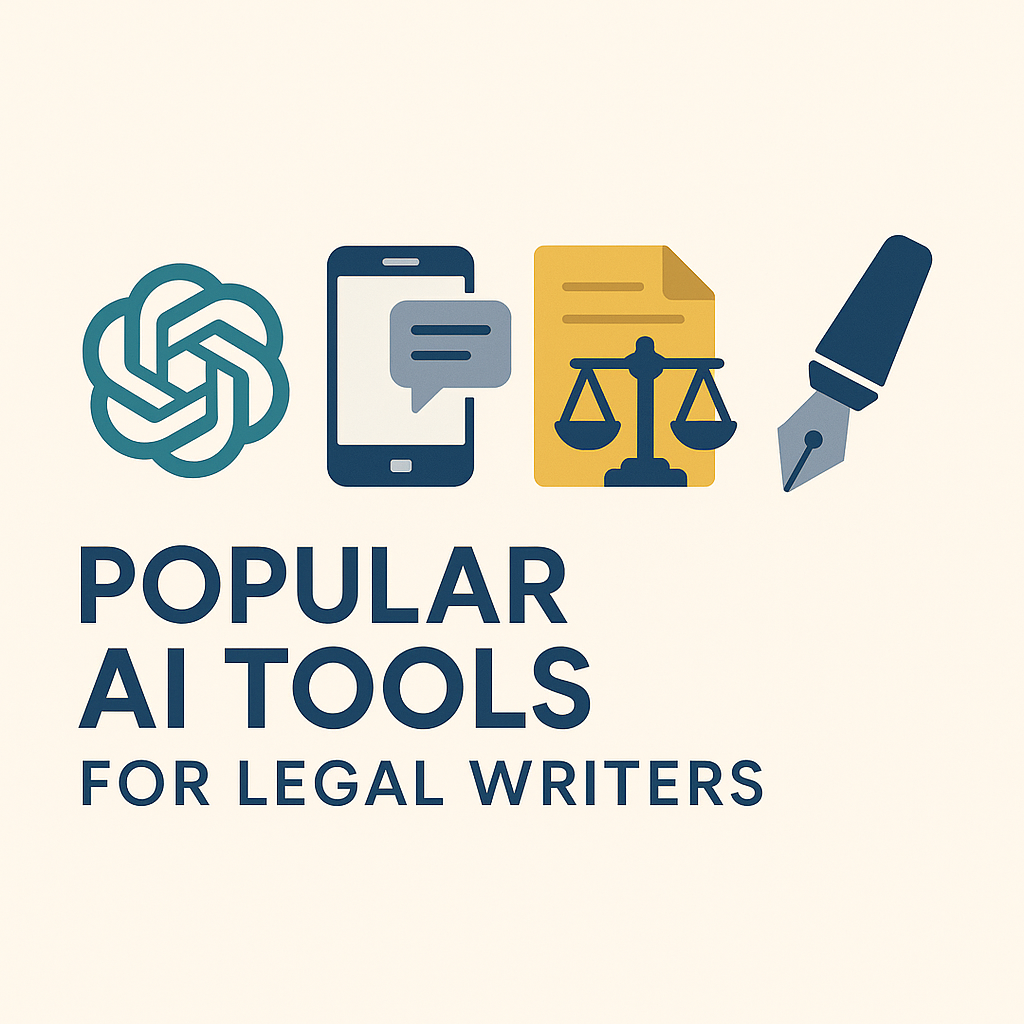Physical Address
304 North Cardinal St.
Dorchester Center, MA 02124
Physical Address
304 North Cardinal St.
Dorchester Center, MA 02124

AI for Legal Writers is transforming the way legal professionals draft, review, and finalize documents. For decades, legal writing demanded late nights, endless revisions, and the constant fear that one overlooked error could result in costly consequences. Every misplaced clause, outdated reference, or formatting slip had the potential to weaken a case or complicate a contract. This was the daily reality for many legal writers before artificial intelligence stepped in as a powerful ally.
Over the past 15 years, AI has steadily evolved from being a simple digital assistant—like basic spell-checkers and grammar tools—into a sophisticated partner that understands the complexities of legal language. Today’s advanced systems can recognize nuanced legal terms, verify compliance standards, and even suggest stronger, clearer alternatives for contract clauses. This progression means that AI is no longer just an optional add-on; it has become an essential resource for professionals committed to producing high-quality legal documents.
One of the greatest benefits of AI for legal writers lies in its ability to prevent critical mistakes. Whether it’s catching repeated errors buried deep in a lengthy contract, flagging outdated statutes, or ensuring formatting consistency across a stack of case briefs, AI tools act as a safety net. They minimize the risk of human oversight while enhancing the precision and clarity of legal writing. The result is not only greater accuracy but also a level of confidence that allows legal professionals to focus more on strategy and substance rather than on clerical details.
Beyond error prevention, AI is also changing how legal professionals manage their time and workload. Drafting contracts that once consumed hours can now be completed in a fraction of that time with AI-assisted templates, compliance checks, and real-time editing suggestions. The stress that once accompanied the painstaking review of long documents is greatly reduced, leaving space for sharper analysis and more effective advocacy.
Importantly, AI for legal writers is not about replacing human expertise. Instead, it is about working smarter, empowering professionals to leverage technology as a partner in achieving excellence. By combining human judgment with machine precision, legal writing becomes faster, sharper, and more reliable than ever before.
As we reflect on 15 years of progress, it is clear that AI is no longer just improving the practice of legal writing—it is redefining it. With AI as a trusted companion, legal writers can approach each contract, case study, and brief with renewed confidence, knowing that the technology is there to help avoid mistakes and elevate the quality of their work.

Legal writing AI has seen major growth from 2009 to 2024. In the early days, most legal professionals used basic tools like Word to draft contracts. Everything had to be done manually. This led to slow progress, missed clauses, and more human errors.
By 2012, the first AI contract drafting software entered the market. These tools could check grammar, flag missing sections, and improve formatting. They helped speed up small parts of legal writing.
In 2015, the rise of natural language processing (NLP) and machine learning brought big changes. AI tools began to understand legal language. They could now suggest better sentence structures, identify risky terms, and support early legal writing AI software users.
Between 2018 and 2022, tools for AI contract drafting became more advanced. They could scan large documents, compare terms, and suggest edits instantly. Some of the best legal writing AI platforms also began offering built-in research tools and templates.
Today, legal professionals use free AI contract drafting tools or paid platforms depending on their needs. The best AI contract drafting tools save time and improve accuracy, making AI for legal writers a must-have in modern law firms and solo practices alike.
Before the rise of legal writing AI, legal professionals often struggled with common errors. Here are the top mistakes they faced:
Today, tools like free AI contract drafting platforms and the best AI contract drafting tools help legal writers avoid these problems. AI for legal writers now makes the drafting process faster, cleaner, and more accurate.

Over the years, AI for legal writers has become a trusted assistant in law firms and solo practices. Here’s a detailed look at how it solves common legal writing problems:
These features make AI contract drafting smarter and help legal professionals work faster, with fewer errors and greater confidence.
AI tools are now essential for modern legal professionals. From drafting contracts to reviewing case law, legal writing AI helps writers save time, avoid mistakes, and produce high-quality legal documents. Here are some of the best tools that legal writers use today:

Lexis+ AI is one of the top platforms used by legal professionals. It combines case law search, legal summarization, and advanced writing support into one powerful tool. It is especially helpful for AI contract drafting and case analysis. You can explore its features on the Lexis+ AI website.
ROSS Intelligence was a pioneer in the world of legal writing AI software. Although it is no longer in operation, it paved the way for smarter legal research using natural language processing (NLP). Many current tools were inspired by the innovations ROSS introduced.
LawGeex is designed to help legal teams automate the contract review process. It uses AI to compare documents against legal standards and company policies, helping you spot risky clauses quickly. For those looking for efficient AI contract drafting software, LawGeex is a smart option. Learn more on the LawGeex official site.
While Jasper is not built specifically for legal work, it’s still useful for lawyers creating content like legal blogs, summaries, or emails. It works well alongside best legal writing AI platforms for marketing and communication tasks. Visit Jasper’s homepage for more info.
ChatGPT is widely used by legal professionals for free legal writing AI support. It can help draft contracts, summarize documents, and even check grammar. It’s a versatile tool for solo practitioners and small teams looking for AI contract drafting on a budget. Try it on the OpenAI website.
These tools show how much AI for legal writers has improved over the last 15 years, offering smarter, faster, and more reliable legal writing support.
AI for legal writers is not just a trend—it’s making real improvements in daily legal work. Many law firms and solo lawyers are already seeing the benefits of using legal writing AI software.
One example comes from a mid-sized law firm that used AI contract drafting tools. They reported a 60% reduction in contract turnaround time. Instead of taking several days to finalize a contract, the firm was able to draft and review documents in just a few hours.
Another law firm improved its overall productivity by using legal writing AI to handle proofreading, formatting, and legal citation tasks. Lawyers spent less time on routine edits and more time focusing on complex legal matters.
Solo practitioners also benefit from free legal writing AI like ChatGPT. It helps them draft client contracts, write legal summaries, and manage workload without hiring extra help. Tools like LawGeex and Jasper are also helpful for solo professionals who need best legal writing AI support.
These examples show how AI is helping legal writers work faster, reduce errors, and stay organized. Whether you’re in a large firm or working alone, AI contract drafting tools can make a real difference.
Risk of Over-Reliance on AI
Relying too much on AI tools can reduce critical thinking and writing skills over time. Legal professionals should use AI as a support tool, not a replacement for their expertise. Balancing AI assistance with personal skill is key to producing strong legal work.
Ethical Concerns and Bias in AI Tools
AI tools have come a long way, but ethical issues still exist. Sometimes, AI may show bias because it learns from past data that might be unfair or incomplete. This can lead to wrong or unfair results in legal writing. Legal writers must be aware of this risk and work to reduce bias when using AI. Ethical use of AI is important to maintain trust and fairness.
Dependence on Accurate Inputs
AI tools depend heavily on the information fed into them. If the input data is wrong or unclear, the AI will produce poor or incorrect results. Legal writing needs precise and accurate input to ensure the output is reliable. This means legal writers should double-check the data before using AI-generated content.
Need for Human Review and Oversight
AI is a powerful helper but cannot replace human judgment. Legal documents require careful review to catch mistakes or misunderstandings AI might miss. Human oversight ensures that legal writing stays accurate, clear, and compliant with rules. Combining AI with human expertise creates the best results.
Limited Understanding of Complex Contexts
AI sometimes struggles to understand complex legal situations or nuanced language. It may misinterpret meaning or miss subtle points that are important in legal writing. This limitation means legal writers must carefully check AI-generated content for accuracy and context.

The future of AI for legal writers looks very promising over the next 5 to 10 years. AI will become smarter and faster, able to handle more complex tasks like drafting contracts and identifying legal issues early on. It will also get better at understanding legal language and context, making legal writing more accurate and efficient.
One exciting development will be the integration of AI with court databases and compliance systems. This will allow legal writers to quickly access the latest case law and legal updates, while also ensuring that documents follow all compliance rules. Such integration will save valuable time and reduce errors.
Additionally, AI will play a bigger role in legal education and training. It can offer personalized feedback to law students and new professionals, helping them improve their skills faster by simulating real legal scenarios.
AI tools will also support better collaboration among legal teams by allowing them to share documents, track changes, and receive AI suggestions in real time. This will improve teamwork and speed up the legal writing process.
Finally, AI systems will continuously learn and improve from new data and user feedback, becoming more useful and reliable over time. This ongoing growth will help legal writers stay ahead and produce high-quality work.
Q1: How has AI changed legal writing over the past 15 years?
AI has transformed legal writing by automating routine tasks like drafting contracts, proofreading, and legal research. It helps legal writers save time, reduce errors, and focus more on complex analysis. Over 15 years, AI tools have become more advanced in understanding legal language and context, improving the overall quality of legal documents.
Q2: Are AI tools reliable for legal writing?
AI tools are helpful but not perfect. They depend on accurate input data and can sometimes show bias or make mistakes. That’s why human review and oversight are essential. Legal writers should use AI as a support tool, double-checking AI-generated content to ensure accuracy and fairness.
Q3: Can AI replace human legal writers?
No, AI cannot fully replace human legal writers. While AI can handle many routine tasks, it lacks human judgment, understanding of complex legal contexts, and ethical decision-making. Legal professionals will continue to play a crucial role in reviewing and interpreting AI output.
Q4: What ethical concerns exist with AI in legal writing?
Ethical concerns include bias in AI algorithms, privacy issues, and the potential misuse of AI-generated content. It’s important to use AI responsibly, ensure transparency, and address any biases to maintain fairness and trust in legal work.
Q5: How will AI impact legal education and training?
AI will become a valuable tool in legal education by offering personalized feedback and simulating real-world legal scenarios. This helps students and new lawyers develop skills more effectively and prepares them for future challenges in legal practice.
Q6: What is the future of AI in legal writing?
The future includes smarter AI tools integrated with court databases and compliance systems. These tools will enhance legal research, ensure compliance, and support better collaboration among legal teams. Continuous learning will make AI more reliable and helpful for legal writers.
In summary, AI has significantly changed the world of legal writing over the past 15 years. It helps legal writers avoid many critical mistakes by speeding up research, improving accuracy, and supporting complex drafting tasks. However, it’s important to remember that AI is not perfect. Ethical concerns, potential bias, and dependence on accurate inputs mean human review and oversight remain essential. Legal professionals should see AI as a powerful tool that enhances their work rather than replaces their expertise.
Looking ahead, AI will continue to grow smarter and more integrated into the legal field. With connections to court databases and compliance systems, AI will make legal research faster and more reliable. It will also play a larger role in legal education, helping future lawyers develop key skills. Collaboration between humans and AI will become the norm, creating a more efficient and accurate legal writing process.
For legal writers who want to stay ahead and make the most of AI technology, staying informed and using trusted resources is key. To explore more about AI tools and how they can improve your content creation, visit icebergaicontent.com. Embracing AI thoughtfully will ensure legal writing remains precise, ethical, and effective in the years to come.
Thanks for sharing. I read many of your blog posts, cool, your blog is very good. https://www.binance.info/register?ref=IXBIAFVY
Your article helped me a lot, is there any more related content? Thanks! https://www.binance.com/register?ref=IXBIAFVY